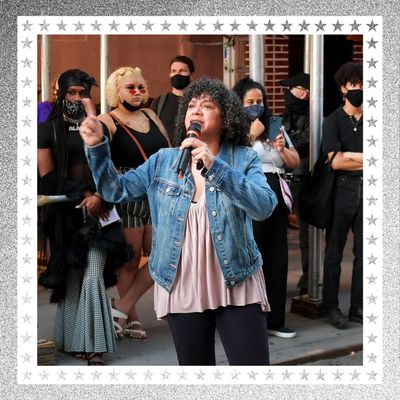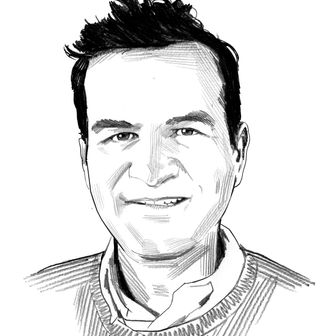
On Friday, campaign aides to Dianne Morales, an unabashedly left-wing former nonprofit executive running for mayor, rallied in Bryant Park to protest an organization they described as fostering racism, sexism, and a hostility to unions. It was something many, surely, had done before, many times. But what made them a center of attention on political Twitter all day was that the protest was against the very candidate for whom they worked. After gathering in the park, the aides marched on campaign headquarters.
Carrying signs that said “Dignity, Care, Solidarity” and “Union Busting Is Disgusting” and “WTF Dianne?!” the protesters-slash-employees called on Morales to recognize their efforts to unionize and to rehire terminated staffers and to “create a grievance process to create a neutral avenue for reporting workplace misconduct.”
The walkout, unprecedented in almost any campaign for high office, let alone one for mayor of New York City in the race’s final days, came as there were increasing questions about Morales’s commitment to progressive causes, including the revelation that she had voted for Andrew Cuomo over Cynthia Nixon in 2018 and was a supporter of charter schools. It was revealed that she had bribed a city Department of Environmental Protection inspector over an unpaid water bill, which led to her leaving her post as an official in Mike Bloomberg’s Department of Education. Which led to questions about what, exactly, a self-styled radical was doing working in Mike Bloomberg’s Department of Education, or why, after that, she worked for a nonprofit developer with a history of evictions. Progressive activists began to wonder how Morales, who has over the last few weeks become the “It” candidate of the city’s left, had seemingly missed most of the fights they had been engaged in over the last several years
“We learned a lesson,” said Susan Kang, an active member of Democratic Socialists of America who previously was supportive of Morales. “You don’t go with an unvetted first-time candidate who tries to claim the progressive mantle when you have never seen them before.”
The collapse of the Morales campaign signals a low moment for a resurgent left that not long ago looked set to dominate the race for mayor this year. Back in 2020, New York’s financial and real-estate elites were so concerned that this year’s mayoral election would herald a sharp leftward turn in city politics that some of them started meeting together in secret, trying to figure out how many millions of dollars to deploy to fend off the rising tide.
Now though?
“I’m sorry,” said one lefty political organizer, apologizing after asking not to be named speaking ill of his fellow travelers. “But this is just such a hot fucking mess.”
As the 2021 race got under way, candidates were talking about defunding the police, putting strict affordable-housing requirements on new development, increasing taxes, and closing the City Hall doors to the concerns of business. The rhetoric seemed to match the mood of the city. In 2018, a 28-year-old bartender named Alexandria Ocasio-Cortez knocked off one of the highest-ranking members of the House, Joe Crowley of Queens, by running on an aggressively left-wing platform. Two years later, a public-school principal named Jamaal Bowman did the same thing in the Bronx to Eliot Engel, a 30-year incumbent. A half-dozen state senators, Democrats who had caucused with the Republicans and were backed by real-estate interests and (tacitly, at least) Governor Cuomo, were run out of office. Candidates running with the backing of the Democratic Socialists of America snatched State Assembly seats away from incumbent Democrats. A poll from the conservative Manhattan Institute found that 79 percent of Democrats thought the city would be better off if it were “more socialist.”
With the mayoral election less than four weeks away, the furrowed brows of Wall Street can unclench. The spectacle of the Morales campaign staff blowing up their own candidate seems to mark the end of any dream of a leftist victory in the June 26 Democratic primary, and many of the progressive organizers and activists who worked years for this moment are left to look only with despair at the waning days of this race.
“When the left decides to get organized and involved in this city, we can be incredibly powerful,” said one operative, who had previously worked for Morales and feels progressive efforts in this year’s mayoral race have never quite jelled. “When we don’t, we just get a shitshow, like we have now.”
For most of the past year, progressive hope was centered on Scott Stringer, who, as a 60-year-old straight white male city comptroller with a long career in government and a comptroller’s flair for spectacle, didn’t exactly fit the young, diverse, and hype-house mood of the moment. Stringer was surging when his campaign was derailed by an accusation that he sexually harassed a volunteer on a 2001 campaign for public advocate. The left-wing lawmakers whom he helped put into office in 2018 and 2020 by backing them early and campaigning vigorously on their behalf quickly abandoned him (even as some have since expressed regrets for acting hastily.)
Morales seemed like a better fit. An Afro-Latina, she, like Bowman and Ocasio-Cortez, came from outside politics. Unlike Stringer, she had never taken money from real-estate interests (Stringer swore off the donations once the campaign got under way), argued that the police “don’t keep us safe,” and pledged to defund $3 billion from their annual budget while creating “a care economy.”
Morales has defended herself with long statements posted to Twitter filled with the kind of postmodern therapeutic lingo more familiar to the student lounges of elite liberal-arts colleges. “Our campaign works to intentionally center the voices of those who are excluded from politics and we acknowledge that mistakes have been made in our attempts to do this,” said one. These have been passed around with glee by Morales’s rivals.
The third candidate holding up the field’s left flank is Maya Wiley, a civil-rights lawyer, MSNBC commentator, and former de Blasio administration lawyer who has so far failed to capitalize on her rivals’ problems and has watched the more moderate Kathryn Garcia pass her in most polls.
All of this has left the left wondering what went wrong, how a campaign cycle that began with so much promise now faces three center-left candidates — Andrew Yang, Eric Adams, and Garcia — consistently holding the top-three spots in the polls. Was the problem flawed candidates or the structure of left-wing campaigns themselves? Or is it that the city just isn’t as progressive as the recent run of local elections made it seem?
In 2013, Bill de Blasio won as an unapologetic progressive and the most left-wing candidate in the race. He pledged to fight the city’s widening inequality, to add a year of free public education for city 4-year-olds paid for by a tax on millionaires, and to end stop and frisk by the police.
But de Blasio also made inroads with moderate communities of color and with labor unions that were not as hip to the latest lingo, something that a candidate like Morales has been unable to do. And the 2013 version of de Blasio was also cozy with real-estate interests and skeptical of some pedestrian and bike-friendly policies passed by Mayor Bloomberg, declaring that “I’m a motorist.”
But many progressive activists fear that the kind of purity tests that have come to be required of left-wing candidates may stand in the way of actual progress.
“I am not introducing Scott Stringer to my lady friends,” said Kang, who added that the Stringer campaign should have responded to the allegations by using them as “a learning moment in order to signal that his mayoral campaign took gender equality seriously.”
“We are not voting on who we would like to take to a social function. It’s about who we want to be mayor,” she said.
Many new left-wing groups have eschewed organizing with more established liberal organizations, let alone labor unions. And their insistence on “being intentional” about who they raise money from has left progressive candidates without the funds needed to compete.
In part, left-wing activists say, the problem is that in order for progressive voters to be motivated, they need something to rally around. In the case of the Bowman and Ocasio-Cortez victories, the issue was an old white moderate incumbent standing in the way of progress. In the de Blasio race, it was 12 years of Mayor Bloomberg. This race, with its sprawling field coming on the heels of eight years of de Blasio, didn’t permit that.
Gabe Tobias, a former campaign aide to both Ocasio-Cortez and Bowman, is now working on an effort to educate voters about how the city’s new ranked-choice-voting system will work and telling them to leave moderate candidates like Yang and Adams off of their ballots. But even those moderates, he notes, talk about left-wing ideas like reforming the NYPD and meaningfully addressing poverty in the city. And had someone like Ocasio-Cortez or Bowman or Public Advocate Jumaane Williams run, he said, they would likely have been cleaning up in this race.
“The candidate is the problem to solve,” he said. “Not the ideology.”






























